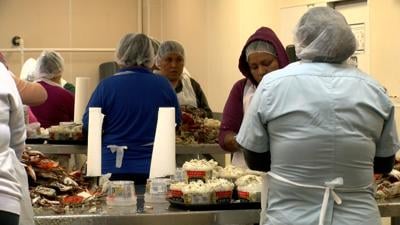CAMBRIDGE, MD - An annual struggle for seafood processing facilities may be nearing its end with the introduction of a proposed Senate bill aimed at addressing their labor needs. The bill, known as Senate Bill 3013, offers relief for businesses reliant on seasonal H-2B visa workers, aiming to alleviate the uncertainty they face each season.
When it comes to seasonal H-2B visa workers, it's a gamble every season. Businesses do not know whether they'll get workers or if they'll have to close their doors. In some cases, for good. SB 3013 would get rid of that uncertainty.
"There are less than 12 Maryland crab-picking houses left," says Aubrey Vincent, owner of Lindy's Seafood. She goes on to say the proposed bill could really provide a lot of stabilization. "It would eliminate a lot of economic uncertainty. So year to year we don't know if we're going to be staffed or if we're going to be able to get the seasonal workers that we've had come in. A lot of my staff has been here for over 25 years so we don't know year to year whether we're going to be able to open our plant or not. So this would eliminate a lot of uncertainty."
To clarify, SB 3013 does not eliminate the lottery.
All seasonal businesses such as seafood processing facilities, landscapers, or resorts all compete for H-2B visa workers. All seasonal businesses still need to go through the standard application process within the Department of Labor, be approved, and request their number of workers. They are entered into the lottery. If you draw an 'A' or 'B' you got lucky and got workers. But a 'C, D, E, F, or G' was not lucky. That is the way the lottery works. The USCIS manages the number of visas permitted.
The way SB 3013 would work, seafood processing facilities would be exempt from the lottery and in the end, they would get their requested number of workers no matter if they drew an E, F, or G. This is because they would be exempt from the Cap Count.
Jack Brooks, owner of J.M. Clayton Seafood is on board with this bill proposal. "You know we have colleagues who are going to be locked out this year who won't open because uh they missed the lottery. Our need for visas in seafood nationwide is pretty static," says Brooks.
The Dorchester County Council says they are backing this bill.
"It will give a lot of the local industry more help than what they're used to getting which they need," says Rob Kramer, Dorchester County Councilmember. He says the council plans to send a letter of support to U.S. Senators sometime this week.
In a quote to WBOC, U.S. Senator Chris Van Hollen said, “Maryland’s small, family-owned seafood businesses are vital to our state’s identity and economy – processing our renowned blue crabs and generating millions of dollars in economic activity annually. But these small businesses constantly struggle to hire enough workers at the time when they need them.” “While I push to ensure the Administration makes the maximum number of H-2B visas available for the seafood industry, they cannot continue to operate when their very survival literally depends on winning the visa lottery. That’s why I helped introduce and am working to pass the Save the Seafood Act and to create a permanent, tailored fix for the H-2B program that will better position Maryland’s seafood businesses to consistently meet their labor demands while supporting American jobs. This long-term legislative solution – along with our ongoing fight to protect the workers in this industry – is critical to the enduring success of Maryland’s cherished seafood industry.”
In a statement, Congressman Andy Harris said, “Numerous seasonal businesses in the First District, especially those in the seafood processing industry, rely on the H-2B temporary worker visa program to meet their labor needs. I have also co-sponsored similar legislation, introduced in the House, that would authorize the exemption of temporary seafood industry workers from the H-2B visa cap. While there is still much work to do, I am supportive of legislation that gives relief to our seafood processors but have been clear that finding a permanent solution to help all seasonal businesses on the Eastern Shore remains one of my top legislative priorities.”


